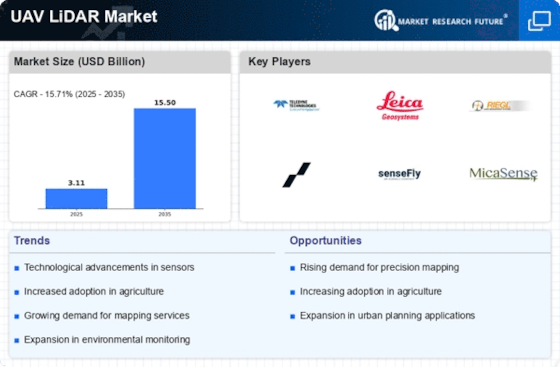Top Industry Leaders in the UAV LiDAR Market

The competitive landscape of the flight tracking system market is characterized by a diverse array of players, ranging from established aerospace and defense companies to emerging technology firms, all working towards providing advanced and reliable solutions for tracking aircraft in real-time. This market has gained increasing importance with the growing demand for enhanced safety, operational efficiency, and regulatory compliance in the aviation industry.
Key Players:
- Airbus SAS (NAVBLUE) (Netherlands)
- ACR Electronics Inc. (US)
- Aireon (US)
- AirNav Systems LLC (US)
- Blue Sky Network (US)
- FLYHT Aerospace Solutions Ltd. (Canada)
- Garmin Ltd. (US)
- Honeywell International Inc. (US)
- Raytheon Technologies Corporation (US)
- SITA (Switzerland)
- IBM Corporation (US)
- Spider Tracks Limited (New Zealand)
- Sabre (US)
- Lufthansa Systems (Germany)
Strategies Adopted: Strategies employed by key players in the flight tracking system market are centered around technological innovation, collaboration, and global expansion. Continuous investment in research and development is essential to enhance tracking accuracy, update frequency, and expand coverage areas. Strategic partnerships with airlines, aviation authorities, and other stakeholders are crucial to ensure the integration and adoption of these systems across the aviation ecosystem. Moreover, collaborations with satellite providers for global coverage and compliance with emerging air traffic management standards are part of the strategies adopted by leading companies.
Factors for Market Share Analysis: Market share analysis in the flight tracking system sector considers several factors, including the accuracy and reliability of tracking systems, coverage area, integration capabilities with existing avionics, and compliance with international aviation regulations. The ability to offer real-time tracking solutions that provide precise and comprehensive data about an aircraft's position, altitude, and speed is a significant factor influencing market share. Additionally, features such as weather monitoring, predictive analysis, and communication capabilities contribute to the overall competitiveness of flight tracking systems.
New and Emerging Companies: The flight tracking system market is witnessing the emergence of new and innovative companies focusing on specific niches within the industry. Start-ups like FlightAware and Spidertracks are contributing to advancements in portable and cost-effective flight tracking solutions. These companies often leverage emerging technologies such as IoT (Internet of Things), AI, and machine learning to enhance tracking capabilities and offer unique features catering to the evolving needs of aviation stakeholders.
Industry News: Industry news in the flight tracking system market frequently highlights technological advancements, successful implementations, and collaborations between companies and aviation authorities. Recent developments, such as the integration of space-based ADS-B for oceanic and remote area coverage or the adoption of blockchain technology for secure data sharing, showcase the industry's commitment to innovation and addressing the challenges of global flight tracking. News related to partnerships and collaborations is particularly important as they often indicate industry trends and the adoption of new technologies.
Current Company Investment Trends: Investments in technology and innovation remain a key trend in the flight tracking system market. Key players allocate substantial resources to research and development activities aimed at improving the accuracy, efficiency, and reliability of tracking systems. Investments also focus on compliance with evolving aviation regulations and standards, including the implementation of Automatic Dependent Surveillance–Contract (ADS-C) and Future Air Navigation System (FANS) technologies. Strategic acquisitions and partnerships contribute to expanding product portfolios and addressing emerging market needs, reflecting the industry's commitment to staying at the forefront of technological advancements.
Overall Competitive Scenario: The overall competitive scenario in the flight tracking system market is characterized by a blend of established aerospace and defense giants and innovative newcomers. Established players leverage their experience, global reach, and diversified portfolios to maintain a competitive edge. Concurrently, emerging companies contribute to the market's dynamism by introducing novel technologies and addressing specific challenges, such as tracking in remote areas or implementing low-cost solutions for general aviation. The trend towards comprehensive, integrated solutions that provide actionable insights to airlines and aviation authorities further intensifies competition in this market.
Recent Development:
Aireon LLC:
Successfully launched its space-based Automatic Dependent Surveillance - Broadcast (ADS-B) network. This network, consisting of 88 Iridium NEXT satellites, provides real-time flight tracking data over oceanic and remote areas, significantly improving air traffic management efficiency and safety.
Partnering with airlines and air navigation service providers (ANSPs) to expand the adoption of its space-based ADS-B technology.
Flightradar24:
Reached a milestone of 50 million users tracking flights in real-time. The popular flight tracking platform offers comprehensive data on flights around the world, including aircraft positions, altitude, speed, and route information.











